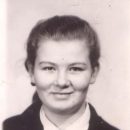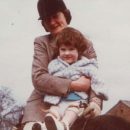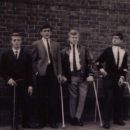School Culture
Michelle Daly: The Spacesuit
Michelle was born in 1972 in Newham, London. She attended a local special school from age five until sixteen and then went on to a local mainstream college.
Here Michelle talks about physiotherapy at school
Transcript
The support was never, from my point of view. It was always based on medical staff and what they felt was needed and maybe said to my parents about what I should have. So what would happen is, I’d go to hospital every month, my consultant would send a report down about what physio I would need. That report would then be sent to the physio department of my school and that was how things would be tailored. A typical example of that, I used to wear something that was called a space suit. It was an idea that was going to be used hopefully, I don’t know what happened, but I was meant to be walking by now. (Laughs) So I would be pumped up with air every morning and zipped. Firstly I’d be zipped up and then pumped with air and I’d have to do ten bars every morning, back and forth, back and forth. So I’d do that till about, so I’d get in school maybe half nine, do that till about maybe quarter past ten and then I would have to, on a zimmer frame, walk down to my classroom and that wasn’t walk, that was shuffling. Bear in mind I hadn’t even got to my lessons yet. I was so tired. So I would stand in a space suit until lunch time, maybe come out the space suit just to go to the loo, and maybe have my dinner and then get back into the space suit again till three o’clock. So that programme was developed around what my consultant would have said cos I was part of this programme that they felt that with my medical diagnosis would maybe possibly be able to walk and this was part of a whole experiment. So whatever my consultant had fed down to the school was what my, was the programme that was going to happen at school. So I had this from about, I think I got the space suit about the age of six to about the age of twelve, this programme would continue. Did your education ever take priority over physio? Never. My education never took priority over physio. Physio was the main thing, part of my childhood. I always resented physio and I remember rebelling. Even in the six week holidays you had physio staff coming to your home, so you never got away from it. (Laughs) The physio wasn’t just part of the school, they’d come over part of school holidays as well. At home I was lucky, I could rebel at home, so the space suit would be hidden in the cupboard until the physios came round. I was lucky then. Mum knew that I didn’t really like it and I cried a lot that I hated it and was painful as well. But I remember that at the age of, I think I might have been about twelve when I’d really just had enough of it and I said 'I don’t want to use the space suit no more, I don’t want to walk no more'. I wasn’t walking anyway. This is not walking, this is restricting me cos I couldn’t engage with anyone, even at playtimes, I’d just stand up against the wall because it would take me maybe the length of this room, 20 minutes just to move across this room. So in the end I said, 'I don’t want to do this no more' and I remember the physio saying to me 'Do you realise that by using the wheelchair, your body’s going to become significantly deformed?'. And I remember that and 'You’re going to lose all your muscle power' and I just could hear things but I can’t remember anyone, I was just like, well life can’t be worse than just standing still like a robot. I’m not moving, so this isn’t life to me anyway. I remember going home to mum and saying, 'I’m not walking, I don’t want to do physio and that’s it. I want a chair, I want to be free'. And that was the end, I think it was and I must have went to my consultant and said 'I’m not being part of this programme no more, I hate it'. So it took me a number of years, longer than I should have. Then when I think once I got my chair, I felt so free, forgot about physio.Explore more
Explore stories by theme or view the timeline of significant events in education for disabled people
![How Was School? [logo]](https://howwasschool.allfie.org.uk/wp-content/themes/hws-base-theme/assets/img/allfie-logo-original.svg)



